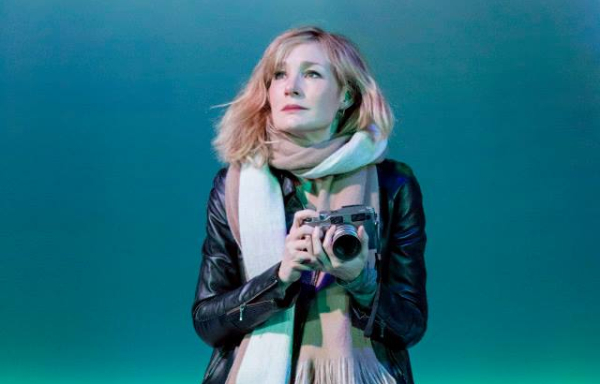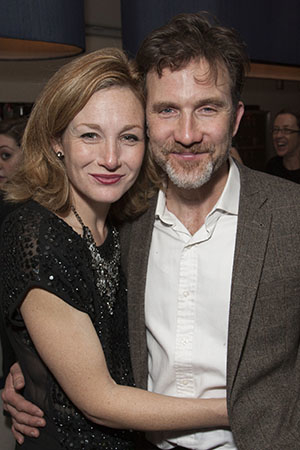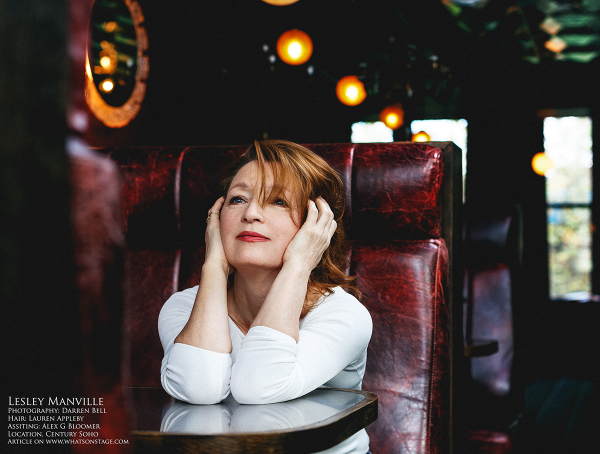Leading Ladies: Nancy Carroll – 'I have no idea how anyone sustains a plan in this business'

© Johan Persson
A recent article on Nancy Carroll was headlined "the best actress you've never heard of," a back-handed compliment that can only half-stick because she's not made a splash on television beyond Midsomer Murders and G K Chesterton's Father Brown stories in which she plays a haughty socialite alongside Mark Williams as the clergyman detective and Sorcha Cusack as his parish secretary.
But anyone who's been paying attention at the National and RSC over the past ten years knows she's one of the real class acts of her generation, and she's currently tearing up the stage as the badly behaved photographer Anna in David Leveaux's scorching revival – with Rufus Sewell, Oliver Chris and newcomer Rachel Redford – of Patrick Marber's Closer at the Donmar Warehouse.
Marber has said that the 1997 play was based on people he knew, and their behaviour. Did she identify with Anna or anyone else in the cast? "She's an amalgam of people I've met. We had to leave our skin at the door for rehearsals. Patrick asked us had we been betrayed, and had we betrayed someone else, and we all said yes. There's always this self-harming when you've been left: you go to extremes when you're hurting so much."
There's one scene in Closer where, as Anna, she describes, all too graphically, what it's like to have sex with another man. She agrees that it's as tough to perform as it is for us to watch it. Closer is still shocking, going just that bit further than you want or expect it to. More usually, Nancy skims along the surface in stylish comedy vein; this performance is something new, even for one who started off at the Bristol Old Vic in 1999 playing Ophelia in the nude.
She was in Leveaux's revival of Tom Stoppard's Arcadia a few years back, a definitive Lady Croom, and then won the Olivier best actress award as the tragic Joan in the 2010 rediscovery of Terence Rattigan's After the Dance at the National; time was up for the bright young things of the 1920s, though she and Benedict Cumberbatch (as her alcoholic husband) pretended not to notice; the show was a real blast, but Bendy was already in demand and didn't want to go to Broadway.
"These things happen," she says with a shrug when we meet in the new Donmar Dryden Street warehouse premises round the corner from the theatre. "I go where I'm wanted. I have no idea how anyone sustains a plan in this business. I feel so lucky to be able to pay the mortgage, or my share of it, by doing what we're passionate about. It's a luxury to do what you love doing…"

© Dan Wooller for WhatsOnStage
"We" is her and her husband of over ten years, Jo Stone-Fewings, who's about to play King John at Shakespeare's Globe. They have two children (Nellie and Arthur, aged six and three) and a dog called Digby, part lurcher part sheepdog, who appeared with them both in the glorious revival of Philip King's See How They Run at the Duchess in 2006, Nancy as a vicar's wife, Penelope Toop, rekindling an old flame with a visiting actor played by Jo.
This was not the first time they filtered their offstage love through onstage illicit dalliance. At the RSC, Jo was Orsino in Twelfth Night, understandably bewitched by Nancy coming on to him as Viola/Cesario on behalf of Olivia. They had become engaged within nine days of first meeting on Michael Wood's television film In Search of Shakespeare with the RSC. And they had a rule that, whatever each of them was up to, and wherever, no two weeks would go by without being together at least once.
Nancy's surprised when I ask if this resolution still holds. "Of course! I know a lot of couples who do this, don't you?" (No, I don't.) Actors who are not related keep in touch in other ways, too. She tells me that Judi Dench and Michael Pennington exchange a black glove whenever possible. She and Broadway star John Lithgow – with whom she appeared in the National's Christmas revival of Pinero's The Magistrate in 2012 – send each other Victorian pennies.
"He even got one to me while filming Father Brown. Sorcha suddenly threw this penny in a kettle on the set. What you do is work through contacts and stage managers and aim for the maximum surprise quotient. It's a way of keeping in touch with people you loved working with."
She was born in Bristol, the daughter of graphic designers – she shares her name with the showgirl and movie star Nancy Carroll of the 1930s – grew up in South London (she acted her head off at Alleyn's School), took a degree in fine art at Leeds and trained at Lamda. At the RSC she's been Lady Percy in Henry IV Part One, Celia in As You Like It and Viola, while at the National she was particularly prominent in Peter Gill's revival of The Voysey Inheritance by Harley Granville-Barker and as Emma Jung in Christopher Hampton's The Talking Cure opposite Ralph Fiennes.
Her other major West End performances were in Peter Hall's revival of Shaw's You Never Can Tell at the Garrick and as the above-herself wife of an MP caught out in the expenses scandal in The Duck House ("At last we're Tories! No more bottles of Jacob's Creek") with Ben Miller at the Vaudeville. You sense there's an awful lot more to come, and one day we'll have to share her with everyone.
One of my favourite of her lesser known performances was as a sucked-in, sensual psychologist in Richard Bean's adaptation of David Mamet's movie thriller House of Games three years ago. As in Closer, she played against type and expectation and dredged up some pretty nasty black stuff with the sedate surface veneer.
She's clever, cool and beautiful, with a voice like clear syrup, a tousled cascade of red hair and a freckled, fair complexion that gives off airs and graces both modern and Pre-Raphaelite. If she doesn't play a great tragic role soon, and win another major award, I'll eat my Stetson. And I imagine most playwrights would want her name on their cast list and most directors, too, especially when contemplating Restoration and other high style comedy.
Closer runs at the Donmar Warehouse until 4 April. Click here for more information and to book tickets.












